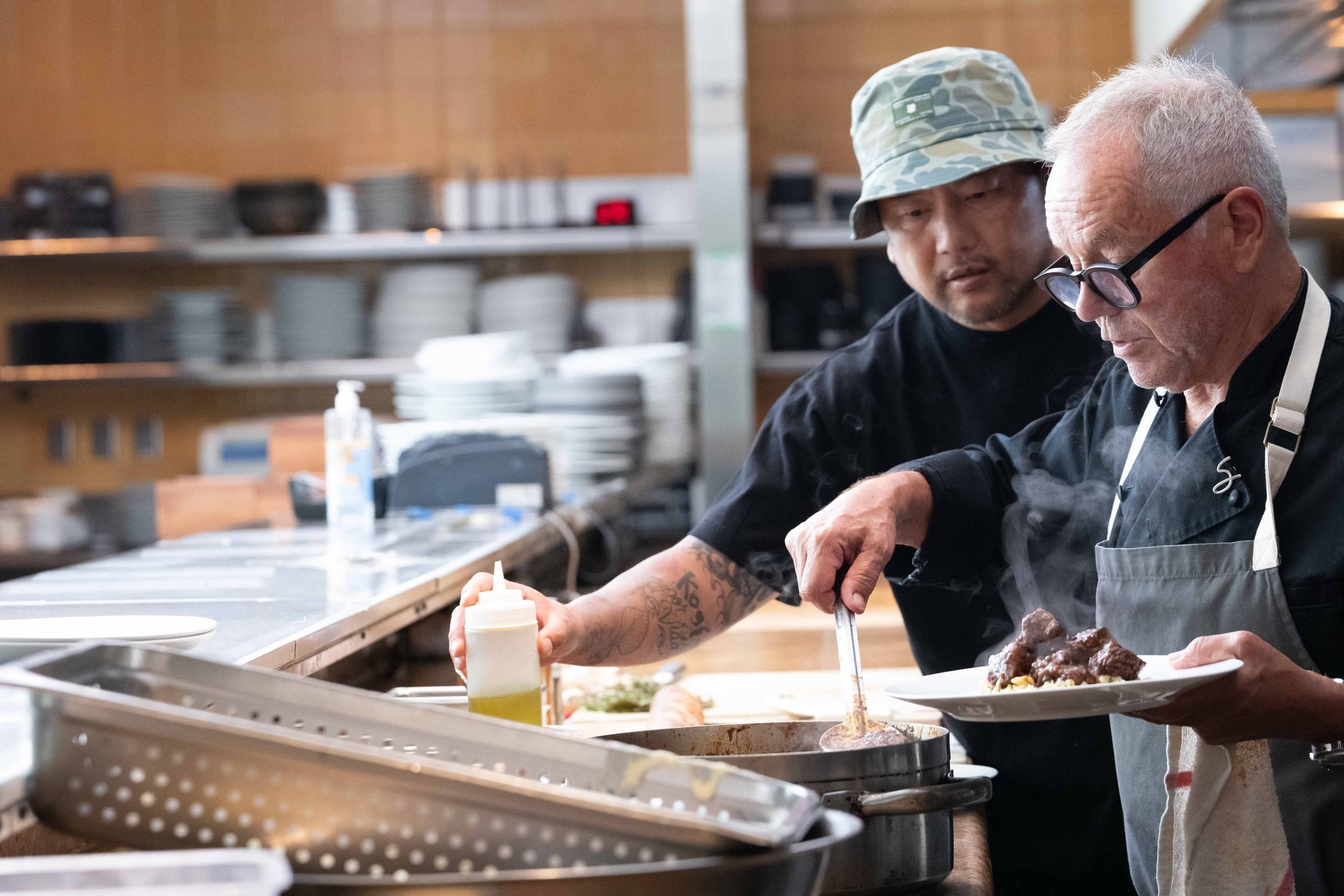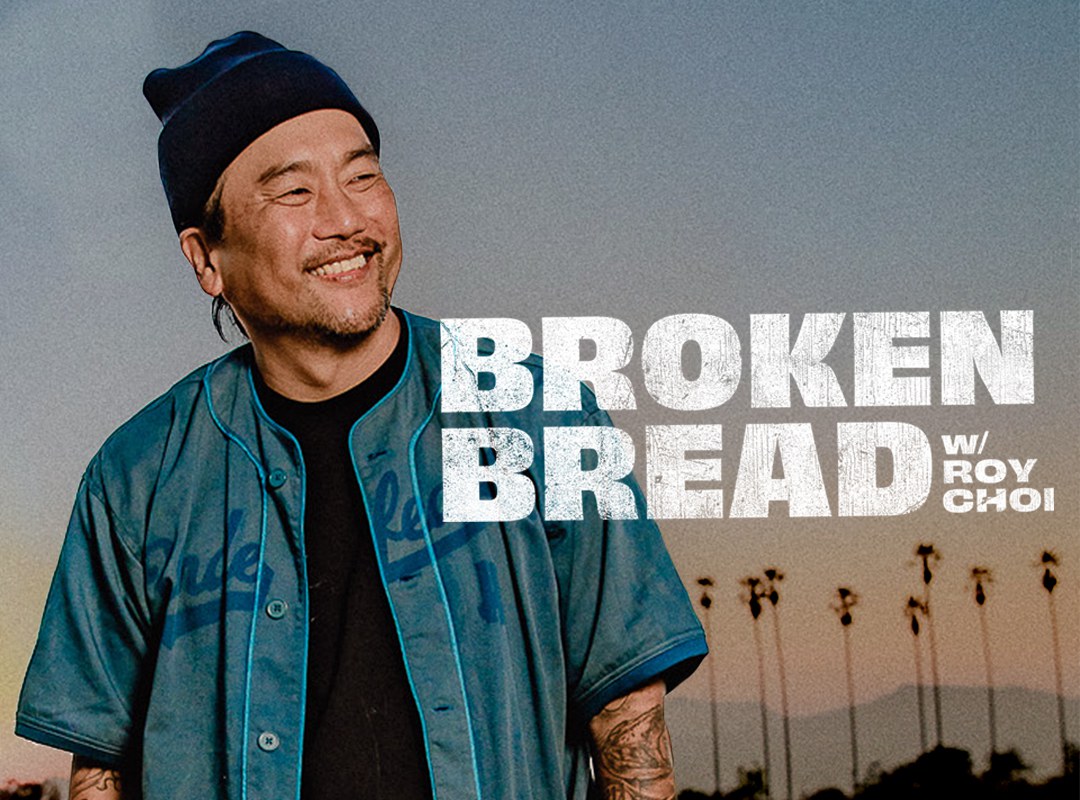In the second season of “Broken Bread,” chef Roy Choi of Kogi truck fame describes the restaurant business as a house of cards — a broken system of exploitation that has been further exposed by the pandemic. Never one to shy away from hot-button issues, Roy cracks open the flaws of the industry, introducing us to people who are looking to flip the script.
Choi says that in many cases, the pandemic allowed people to find their new calling and change trajectories. Uyên Lê worked in the public service and activism before becoming a cook. At Bé Ù, she asks, “If the system is broken, why do we have to succumb to the system?” Fair pay, benefits, paid time off, and affordable food are all part of her agenda. Season two of “Broken Bread” can be seen on Tastemade and local PBS affiliates.
The following interview has been edited for length and clarity.
KCRW: Tell us more about Uyên Lê, who says “disruptions are opportunities for innovation.”
Roy Choi: She needs her own show, first of all. She's way better than I was on screen. She worked in the public service and activism space before becoming a cook or a chef through the pandemic, which happened to a lot of people and a lot of us … it changed people's trajectory. And it changed what they decided they wanted to do with their life. In many cases, the pandemic became a calling for a lot of people.
Her calling was to open a restaurant that was equitable for all, that really pushed the envelope of this idea [of], why do we have to run a restaurant on exploitation? Even if the system is broken, do we have to succumb to the system? And she said, “Listen, I'm gonna make sure that all the things that I believe in — fair pay, health benefits, paid time off, affordable food, neighborhood connections — that these things matter. And I'm going to make sure it matters. If the restaurant survives, that's great, but at least I did it with dignity.”
It's like she's thrown down the gauntlet, not just for herself, but for people watching what she's doing.
Yes. And innovation, as she said, with disruption can only come if you create a new model, and she's being courageous enough to put her whole financial situation and life on the line to make an equitable system that changes. If she becomes popular, if she becomes the best restaurant in LA, if you guys as food media crown it and it goes around the world … people will follow. And if her restaurant becomes successful, if her model becomes successful, then that's just only going to create change.
Let's talk about the need to re-engineer eaters’ minds about what foods are deemed cheap and inexpensive. There's one moment in your show where Javier Cabral of LA Taco is holding a plate of a taco. Go ahead and set that up for us.
Yeah, that was a really interesting move by Javier. And it made complete sense in the moment. You know, Jonathan from Macheen at Milpa Grille made these wonderful — it was actually an ode to me, it was a surprise — he made his version of a Korean barbecue taco. He brought it out, and we all laughed, and we're just having a moment together. And then all of a sudden we were talking about what foods are labeled cheap, how it can be exploitative. In most cases, it's usually food of immigrants and people and communities of color that are labeled this way. And in many ways, it's a form of racism, to call something cheap.
And then we started going into storytelling. As a cook, we know that the cost of pasta to make a dish of marinara pasta is maybe only $4, $3. But with storytelling, you can charge $32 for that plate. But you can never charge $32 for a bowl of pho or a plate of chow mein. So we were into this discussion about what determines value within food, and then the taco came out right at that moment. The maximum tacos can be is $5, no matter how great they are, how much work goes into it. So, Javier right at that moment, pulls the tortilla off. It naturally fell into … the right place and the sauce got kind of splattered like a Jackson Pollock painting. He asked me like, “This taco with the tortilla is $5 at the most. Now look at it without the tortilla, it looks like some avant garde chef plate. How much do you charge for this and that?” I said $14 or $16.

In the episode "The Future of Restaurants," Roy Choi breaks bread with Chef Wolfgang Puck. Photo by Stephen Vanasco.
In the series, you return to Chinatown ten years after opening Chego, and you tackle gentrification and your part in possibly displacing people who lived there for generations. Give us a bit of the history that you learned and the problem with the word “revitalization.”
We always knew we wanted to do an episode on gentrification. But being the show that we are, we didn't want it to become political or divisive. We want it to become humanizing. … The first window in was, can you still be a gentrifier if you're from the neighborhood itself? Because it started to scratch at the itch, what is gentrifying? What if you are the kid of a third generation store or a legacy business? Your parents are too old to keep doing it. You go in, you're young, you're in your 20s, and you open a third wave tea shop. But it's your family business that you did homework on when you were a kid. But because it's something new and fresh and great, it will bring in attention. Are you still gentrifier?
And then it led to, the only way to humanize this is maybe I can offer up my own story. [When] we opened Chego in Chinatown … I thought that I was going in with all good motives, like we're going to bring more job opportunities, people to Chinatown, [that] the residual business would trickle off and help a lot of the smaller merchants. And I didn't really think about any negative effects. And also, I didn't think about the magnitude of the impact a small restaurant like Chego would have in that moment in time in the food world.
But by opening Chego, it became this hornet's nest of immediate attention. And it was labeled the hottest restaurant neighborhood in the country. And then from that, all these stores came and this word “revitalization.” So I don't think that the core of the problem was the small merchants coming in. But what happened was when that word “revitalization” comes, developers and landlords latch onto it. And what happens is, an area where they were only able to get maybe $800 a month for certain tenants, they're now able, in the marketplace, able to get $3,800 a month. So the only way to get that $3800 is to kick out the $800 a month residents. And in many cases, that's not done in a nice way. In many cases, it's done in a very evil way. For example, shutting off water.
And then what happens is, these residents are just forced to leave. The reason why it's so silent is because many of these residents’ English is not their first language. And many of them are immigrants. So either they can't speak up, they're afraid to speak up, or they don't know where to speak up. And then you have these huge condo complexes coming in. What the neighborhood is called changes. I just want to look at it and not paint a picture of complete evil, but look at all sides: legacy businesses, the history in the Museum of Chinatown, the resistance groups, and also the new merchants, and try to stitch together not who's to blame, but what can we do?

In the second season of his series “Broken Bread,” chef Roy Choi tackles issues of exploitation and gentrification. Photo by Audrey Ma.
Another community in the throes of these kinds of changes is Leimert Park, where you visited some Black owned businesses that are thriving and giving back to the community while creating legacy and generational wealth. Talk a little bit about who you visited.
We focused the episode on the idea of Black ownership and entrepreneurship. There are many, many issues and layers of issues that affect the Black communities here in America. But one of them that doesn't get talked about that much is the ownership of land and the ownership of your business and the property. When you really dig in, that's one of the most fundamental points, especially within a capitalist system. And the reason why is because no matter how successful you become, if the community cannot own the land in which they operate or live, they can always be at the mercy of whatever is being dictated. And that was the biggest concern with a place like Leimert.
And it doesn't matter the romantic or historical value of a place like that, whether it's Harlem or Leimert Park, you can be pushed out. And we used Venice as an example of that. Right now, in real time, you're facing a situation where you have the most historic Black neighborhood in, possibly, America, and it's at the crossroads of maybe not being there anymore within the next 10 years. And a big part of that is because many of the residents and generations of communities and families there don't own the land.
For people who want to support restaurants that are focused on making the industry more equitable, what can we do?
Whenever you can, it's always important to buy local, and that goes down to toilet paper, to fruit. Support your farmers markets, your farmers, your local store, restaurants, juices. Whenever you have a moment, try to be proactive. It's not that hard, and it opens your eyes to your own neighborhood.
The second season goes beyond these particular concerns. Most people would be shocked to learn that half of the world's seeds are owned by four corporations. You decided to share the work of Kristyn Leach of Namu Farm and what she's doing to democratize seed breeding.
We thought maybe that that would be one of the episodes that were least impactful to even us as a story producers. But it was the most impactful. I know talking about seeds is not the sexiest thing in the world. And it's hard to see the tangible relationship to your everyday life. But if all the seeds in the world are owned by maybe five, six, seven corporations, we're done as humans. Because then everything that we eat can be engineered and controlled.
We worry about mind control with our smartphones and all of the algorithms and data. That's nothing compared to once they control all the things that we eat. Instead of getting too depressed about it, we try to be a show of inspiration and hope. There's this resistance force out there of small farmers, soil preservationists, thinkers, rebels, very underground. And they're protecting the seeds. They're literally protecting the seeds and sharing them through a positive black market. They’re saving the seeds, hiding them, bringing them, protecting them, and sharing them with each other and just planting them. It's like the most punk rock thing ever.
